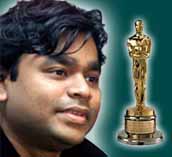Slumdog's Oscar music king Rahman: "God is great"
 Mumbai, Jan. 22 : ByLos Angeles - AR Rahman, the undisputed king of modern Indian music, has won plenty of awards.
Mumbai, Jan. 22 : ByLos Angeles - AR Rahman, the undisputed king of modern Indian music, has won plenty of awards.
But nothing prepared him for the butterflies in his stomach as he walked up on the stage of the Kodak Theatre in Los Angeles in front of an audience packed with the world's most famous cinema stars to accept not one, but two, of filmmaking's most prestigious awards.
"I am excited and terrified," Rahman said half-jokingly, half-seriously. "The last time I felt that way was during my marriage."
Rahman, 42, received awards for best original music score and best song, Jai Ho, featured in the movie Slumdog Millionaire. Jai Ho has become a global hit, and Gulzar, the poet with whom Rahman collaborated on the song, also received the award.
Slumdog took eight of the 10 awards it had been nominated for Sunday night: best picture, best director, best adapted screenplay, cinematography, original score, sound mixing, film editing and original song.
Between the two music awards, Rahman stayed on stage and performed both Jai Ho and the other single from the film, the opening theme O Saya, surrounded by whirling dancers and thrumming drummers.
He wrote O Saya with Maya Arulpragasam, the Sri-Lankan-born hip-hop artist called MIA.
The third nominee for best song was Down to Earth from the animated film Wall-E.
"The essence of this film is about optimism and the power of hope in our lives," Rahman said. "All my life, I've had the choice of hate and love, and I chose love."
He ended his speech with a phrase in the Tamil language that he said means "God is great."
Rahman, who has done music scores for half a dozen Hollywood films and has worked with Andrew Lloyd Webber, knows directly about hope and optimism from the hardships he has overcome in his own life.
Born in 1966 in a Tamil Hindu family steeped in music, Rahman was known as AS Dileep Kumar until his parents converted to Islam in the 1970s and renamed him Allah Rakha Rahman.
The Islamic Sufi strain has had a deep influence on his life and music. Rahman's father died while he was young, and the family had to rent out their musical instruments to get by.
The talented Rahman learned music from an early age, and at 11, he was playing the synthesizer in a local orchestra. He soon dropped out of school and devoted himself full time to music.
Rahman later won a scholarship to Trinity College of Music in London, where he got a degree in Western classical music. He hit it big with Indian director Mani Ratnam's film Roja in 1991.
Despite his high profile in the music world, it took a film like Slumdog Millionaire to get him the international attention his fans feel he has long deserved.
Heading to Hollywood for the ceremony, he admitted to feeling a tad nervous.
"I feel like one of our sports persons at the Olympics who is being told to bring home a gold medal," Rahman told the PTI news agency. "I hope I don't let down people in India who are expecting me to win the Oscar."
Slumdog has created waves internationally in the past few months, but in India, Rahman has long been a household name. His music, mostly composed for Bollywood films, has ruled the airwaves for more than a decade.
Year after year, Rahman, who started off as a jingle composer for advertisements, unfailingly spins out top-of-the-chart hits, each a mark of his versatility and penchant for experimentation.
"He has put Indian music on top of the world," Indian music director Shankar Mahadevan said after the Golden Globe awards. "From here, the future looks good, and Rahman is solely responsible."
A versatile composer, Rahman creates scores that are often a fusion of two or more oeuvres. Other international works to his credit include the Chinese film Warriors on Heaven and Earth, Webber's musical Bombay Dreams and the stage adaptation of Lord of the Rings.
In Slumdog, he blended classical Indian music styles and instruments, such as the sitar, with Western electronica, Brazilian drumming and reggae. His studio in Chennai is said to be one of the best equipped in Asia.
In many ways, the young Rahman revolutionized the Indian music scene. His aim, he said, was to make the music exciting enough to attract young listeners. In his native Tamil Nadu state, they call him "the musical storm." (dpa)